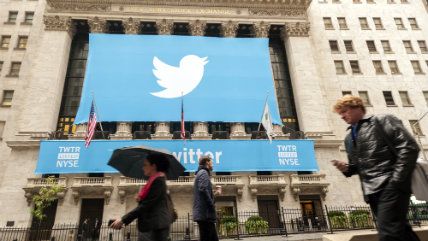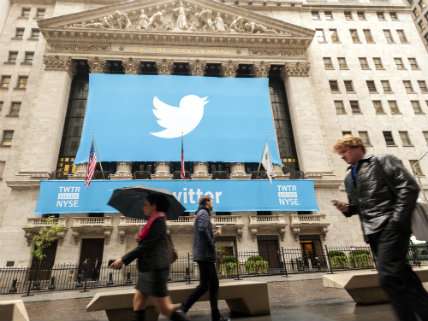Why Is Twitter a For-Profit Platform, Anyway?
The idea that Twitter should be run by the federal government is silly. But perhaps the platform isn't best operated as a for-profit public corporation.


Poor Twitter. By now, the persistent tug-of-war among user groups complaining about disagreeable content and others who point to the platform's free speech roots has been exhausted to the point of cliche. But as the now-ubiquitous microblogging platform continues to crack down on certain speech while its stock price continues to struggle, some are questioning whether Twitter can survive as a for-profit company at all.
Earlier this month, Twitter rolled out new shadow-censorship tools in an effort to cut down on what some consider platform subversion. In addition to expanding permanent bans of users deemed to be abusive, Twitter is introducing "safe search" and "low-quality Tweet" collapsing tools to automatically hide the content that Twitter's "Trust and Safety Council" deems to be too hot for chaste eyes. "Making Twitter a safer place is our primary focus," reads a blog post announcing the changes. "[We will] continue to move at this speed until we've made a significant impact that people can feel."
The impact was felt quickly indeed. Many users immediately reported odd behavior, such as inexplicably disappearing replies and rashes of banned accounts. Some of the bans struck users more as opportunistic censorship than a genuine crackdown on abuse.
The "Silence of the Frogs"
In what Andrew Sabinski of the International Business Times is calling the "Silence of the Frogs," several members of an online surrealist collective called "frogtwitter"—which is hard to summarize, but is mainly comprised of a ragtag clique of satirical accounts including post-techno-nihilists, Kantian essentialists, aesthetic occultists, audiovisual artists, and vitalist-nudist bodybuilders—have been targeted for bans despite a lack of a history of demonstrable abuse. Frogtwitter is definitely an odd flock, but "being weird" alone does not officially meet the Twitter definition of abuse (yet).
Say what you will about the accelerationist worldview of British philosopher and "neo-reactionary" guru Nick Land, for example, he is nothing but civil on Twitter as he undertakes his quest to awaken a technological singularity that will render humans functionally obsolete. Still, Land's Twitter account was banned in the purge, only to be reinstated with little explanation a few days later.
I talked with "Kantbot," one of the leading content creators associated with frogtwitter, about his experience with the new Twitter rules. Kantbot has garnered over 10,000 followers through his off-kilter and aphoristic philosophy Tweets, in addition to his writing and performance art. His account was locked several times during the ban effort, and he felt compelled to delete several thousand tweets to avoid being kicked off the platform as many of his comrades-in-Tweets had been.
While Kantbot admits that his satirical posts can be controversial, he says he maintains e-friendships on Twitter with users across the political spectrum. He told me that he sees his account mostly as a literary endeavor in the "tradition of [Jonathan] Swift, [Alexander] Pope, and [Henry] Fielding," and that he hopes his content will "inspire people, entertain, and make people think about the relationship between social media and art." He does not believe that he is being targeted because he has been abusive, but as part of a "deliberate campaign" to get frogtwitter off the platform.
It's more than a little bizarre that a tiny group of performatively absurd yet temperamentally benign Twitter users would be specifically targeted for digital annihilation while propaganda and spam bots, psychopathic trolls, and violent religious fanatics still run rampant on the platform. And the ban-hammer has not just fallen on frogtwitter; libertarian personality Tom Woods has likewise reported that some of his tweets appear to be censored by Twitter, for example. It is entirely possible that frogtwitter and others were merely the causalities of an overly-broad filter net rather than a deliberate attack on specific groups. But unfortunately for Twitter, without more transparency into the adjudication process the perception that such actions are capricious or politically motivated could only serve to further aggravate segments of its user base and undermine overall platform use.
Nationalize Twitter? Not So Fast
The other, more discussed side of the Twitter-speech debate—journalists, celebrities, and even the occasional CIA operative alarmed about antagonism directed their way on the platform—also poses problems for Twitter's user engagement and growth, of course. Who wants to use a product that has mostly devolved into a hyper-efficient insult delivery service?
And Twitter's content troubles have transpired while the service has also struggled to stay afloat financially. Despite Twitter's global saturation, it has had a famously hard time monetizing all that attention. Advertisers are losing interest in the platform, which could further harm the company's stock trajectory.
Twitter's precarious position has left some users—traditionally those on the left—calling for Twitter to be pseudo-nationalized by the federal government through "social network neutrality" or classifying the platform as a public utility. Applying traditional monopoly analysis, they argue that Twitter's dominant market positions could allow it to unfairly downplay competing services or prioritize the company's own related commercial interests. Others say that privacy concerns should compel some kind of government regulation.
Interestingly, these tides have recently turned. These days, I more often hear people on the right make the argument that services like Twitter should be run by the federal government. (Many on the left, meanwhile, have turned to petitioning internal social-network regulatory bodies, like Twitter's aforementioned Trust and Safety Council, to implement their desired platform changes.) The baroque reasoning goes like this: Private companies don't have to afford the same kinds of free speech rights that the federal government does. If the federal government takes control of the platform, U.S. users will be afforded the due process and First Amendment protections many feel are owed to them on Twitter.
But the inherent surveillance and procedural problems presented by this "solution" should be immediately apparent. What's more, the Twitter user base extends to millions of people outside of U.S. borders. Some Americans might not mind if their government ran a major social network, but plenty of people around the world certainly would. And let's not forget HealthCare.Gov; the federal government doesn't have the best track record running major public websites.
Decentralize or Die?
Still, there may be something to the argument that a service like Twitter is not best run as a for-profit public corporation. The network's initial public offering was three years ago, and it does not seem to have generated much in the way of service improvements or even lasting market valuation. Rather, it appears to have mostly induced anxiety and fast "fixes" in Twitter's upper management as they eye dwindling stock valuations every quarter.
New York Times technology columnist Farhad Manjoo has argued that for Twitter to stay afloat, it should scale back its Facebook- and Google-envy and mold itself more in the model of Wikipedia, or even as a public-minded and publicly-traded company like Manjoo's own employer. But while this kind of path forward might alleviate some of the profit-anxiety plaguing the platform's operators, it wouldn't do much to cure Twitter's bickering bottleneck problem, where a centralized service is expected to build a single set of rules and tools that will suit all of its millions of users' wildly diverging tastes and politics.
Stepping back a little more, it's not even clear that a microblogging service like Twitter needs to be run on a single central platform at all. We don't rely on a single central provider to facilitate email, or access the web, or operate chat rooms—and we certainly don't ask any one provider to be the sole arbiter of our metaphysical, socioeconomic, and geopolitical disputes in these communications! Rather, we can choose from a variety of email providers, browsers, and IRC clients that best suit our unique needs—or even build and run our own if we want—because these functions are protocols on which people can build different applications to interface. Twitter, on the other hand, has become less inter-functional overtime, cutting off tools for developers to build onto Twitter since 2012.
Federated microblogging services already exist. The idea behind these projects is that no one platform can unilaterally control the user experience; developers are free to build different applications to interact with the protocol without loss of overall functionality. For example, users of different GNUSocial applications can view the microblogs of each other—unless they don't want to, in which case special tools can be built for different groups. The point is that users are more in control of their experience because they don't have to rely on one monolithic entity that is conflicted and slow to move.
Of course, we're a long way away from a world dominated by federated microblogging services. Very few people use such programs, and Twitter has shown no indication that it wants to move away from a for-profit model, let alone become an enthusiastic participant in a free and open software movement. But crazier things have happened before. A libertarian can dream!


Show Comments (88)